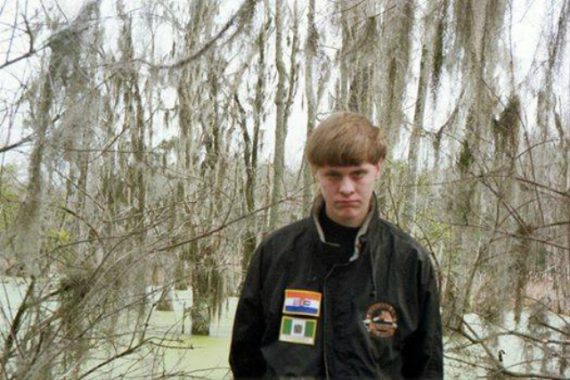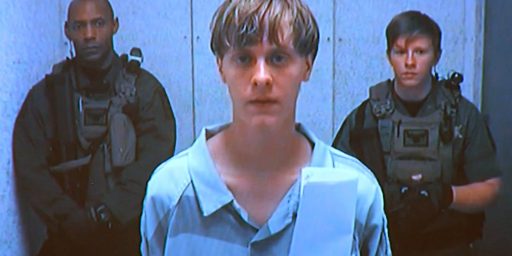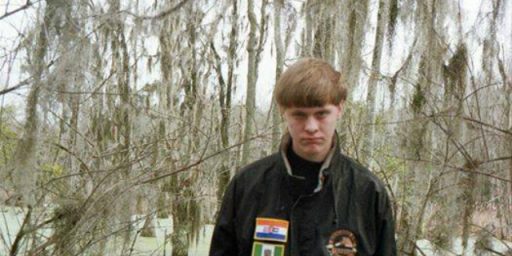Charleston Shooter Dylann Roof Indicted On Federal Hate Crimes Charges
Dylann Roof has been indicted in Federal Court for completely unnecessary reasons.
Dylann Roof, the shooter who killed nine people and injured three others in a racially motivated attack on at an historically African American church in Charleston, South Carolina, has been indicated by a Federal Grand Jury on thirty-three counts that include hate crimes charges:
The man accused of gunning down nine people inside a historic African American church in Charleston, S.C., last month has been indicted on federal hate crime charges, Attorney General Loretta E. Lynch announced Wednesday.
Some of these charges carry the death penalty, though Lynch said no decision has been made yet on whether the federal government would seek that sentence.
Dylann Roof was indicted by a federal grand jury in South Carolina and charged with killing and attempting to kill African American parishioners “because of their race and in order to interfere with their exercise of their religion,” Lynch said during a news conference in Washington, D.C.
The 33-count indictment alleges that Roof decided months before the shooting to attack and kill black people, picking the “Mother Emanuel” church in Charleston because of its larger renown and significance. In addition to killing people due to their race, the indictment also states that he attacked people who were exercising their religious beliefs.
“Met with welcome by the ministers of the church and its parishioners, he joined them in their bible study group,” Lynch said. “The parishioners had Bibles. Dylann Roof had his .45-caliber Glock pistol and eight magazines loaded with hollow point bullets.”
Roof, 21, had already been charged with nine counts of murder and three counts of attempted murder for the shooting spree. Lynch did not say how the federal charges would affect the state’s prosecution, describing them as “parallel” processes that would make their way through the courts. The office of the prosecutor for Charleston County did not respond to requests for comment Wednesday.
The indictment notes that three of the victims of the shooting were between the ages of 70 and 87 years old. According to the federal death penalty statute, one of the aggravating factors that can warrant a death sentence is if the victims are “particularly vulnerable due to old age.”
Lynch said that before the federal government determines whether or not to seek the death penalty, the families of the church victims would be consulted. Ultimately, Lynch will make the final decision.
Days after the massacre, authorities confirmed that Roof had posted a racist manifesto on his Web site, filled with racial stereotypes and diatribes against black, Jewish and Hispanic people. In one part of the rant, Roof criticized people who only talked online and declared his desire to take action.
“We have no skinheads, no real KKK, no one doing anything but talking on the internet,” he wrote. “Well someone has to have the bravery to take it to the real world, and I guess that has to be me.”
The site was also laden with photos of Roof holding a .45-caliber Glock pistol and a Confederate flag. One official said it was last modified just hours before the shooting attack inside the church.
“I have to do it,” the church gunman told his victims, according to Sylvia Johnson, who spoke to a survivor and is a cousin of a pastor who died in the attack. “You rape our women, and you’re taking over our country. And you have to go.”
The Post and Courier first reported Wednesday that they were imminent, while the New York Times first reported that Roof was indicted.
A law enforcement official had said last month that Roof was likely to face hate-crime charges stemming from the attack, and an official Justice Department statement said that authorities were investigating the shooting “from all angles, including as a hate crime and as an act of domestic terrorism.”
Of the many high profile cases in recent years that have been reviewed by the Justice Department, such as the George Zimmerman/Trayvon Martin case and the shooting of Michael Brown in Ferguson, Missouri, this is the first time in some time that case like this has resulted in a Federal Court indictment. In this case in particular, it’s an atypical event simply because Roof is not a government employee such as a police officer but instead a civilian. In these cases, the Federal Government is required to prove, essentially, that Roof targeted the victims in this case because of their race and/or religion and that he acted in a manner designed to deprive of their civil rights, including their right to life. Given some of the facts that have come out about this case, this probably isn’t going to be very hard to prove. Roof apparently admitted to officers after he was arrested not only that he committed crime but that he did so for reasons rooted in racial hatred. There has also been evidence uncovered from his blog and from searches of his residence evidencing his immersion in white supremacist ideology and, apparently, the fact that he had been planning this attack for some time prior to June 17th. Given all of that, the U.S. Attorney seemingly has a very strong case against Roof should the Federal charges ever actually go to trial.
While all of this is going on, of course, Roof is also facing charges for murder and attempted murder in the state court’s of South Carolina. Last week, the Judge presiding over those charges set a preliminary trial date for July 11, 2016, although it’s likely that this date will be delayed for any of the numbers that one would expect in a high profile criminal case such as this. These state charges also carry with them the possibility of the death penalty, but it’s unclear when or if Roof would be executed if were sentenced to die under South Carolina law. While the state does have the death penalty. there hasn’t been an execution in the Palmetto State since 2011, and the process is effectively under a moratorium right now because South Carolina, like many other states, is unable to obtain the drugs necessary for lethal injection due to the fact that drug companies are increasingly unwilling to sell them. This apparently isn’t a problem in the Federal system, although it has been some time since there has been an execution under Federal as well and its unclear how long the Federal Government will be able to have access to these lethal injection drugs. Whether this issue will play a role in deciding which jurisdiction goes first when it comes to proceeding against Roof is unclear, but the availability and likelihood of the death penalty is likely to play role in making that determination.
As is usually the case with these types of situations, the inevitable double jeopardy questions arise when a Defendant like Roof is charged for what are essentially the same crimes in two different courts. Outside of the fact that the Federal charges will require prosecutors to prove the elements regard racial and religious bias, there is no substantive difference between what will happen in Federal Court and what will happen in the state courts of South Carolina. Indeed, given the fact that the Federal indictment originates in the District Court based in Charleston, both the Federal trial and state trial will be drawing from the essentially the same pool of prospective jurors. They will be using the same evidence, largely the same witnesses, and dealing with the same facts. Even the facts related to racial and religious bias are not essential to convicting Roof under state law, it is seems obvious that the prosecutor will attempt to bring these things out at trial and will most assuredly bring them to the jury during the sentencing phase of the proceedings. In a past era, where racially motivated crimes like this would not be perused vigorously by prosecutors in the South, there was perhaps an argument for using Federal law as a backstop to ensure that justice prevails in these types of cases. That’s not the situation today. The prosecutor in Charleston is aggressively prosecuting these murder charges, and has the backing of every political leader in the state as well as the people of South Carolina. The Federal prosecution is, as Jonathan Blanks and Scott Shackford put it, utterly superfluous and unnecessary. Ideally, the Justice Department will let the state go first here and, assuming that Roof is convicted an sentenced as anticipated, just let the matter die. There’s no need for two trials in this case.
Here’s the Indictment:




C’mon Doug, you know as well as I that these Fed Prosecutors have to prove that they are important people and they will NOT be ignored.
Cue Inigo Montoya:
@DrDaveT:
Are you suggesting that Roof was acting as a government agent when he murdered nine people?
So does Scarlett Wilson act for all the people of North Carolina AND me, an Illinoisan and Citizen of the USA?
I want this thug to know that I am prosecuting him too.
@Doug Mataconis:
No, I’m suggesting that you don’t seem to know what the word “civilian” means. Here’s a hint: police officers are civilians. Employees of the Department of Defense are also civilians. Active duty members of the armed forces are not.
@DrDaveT:
AMEN! Although I guess you really can’t blame Doug for being confused given the militarization of the police. How long before we start calling them “warriors” instead of officers?
@DrDaveT:
I was using the term civilian in more generic sense to mean non-government officials, but I get your point.
I´d like to see him rot in ADX Florence. I´m generally against torture, but he deserves to rot there.
@DrDaveT: Merriam-Webster begs to differ.
@rodney dill:
Yes, but Merriam-Webster is to dictionaries as Yugo is to cars. For example, they list “to hint or suggest something” as a primary meaning of infer.
“Civilian” is in fairly common usage within the law enforcement community, at least among uniformed police officers, to refer to people who are not police officers. This has been true for a long time.
Cast all the aspersions you want at Merriam-Webster, but their definition is an accurate reflection of what the word means, not what it should mean. Doug’s use of the word is correct.
@DrDaveT: I checked a half dozen or so online dictionaries all pretty much with the same result. Wiki was a little different. I guess we should all infer something from that.
I doubt anybody would care if Dylann Roof was charged with taking a picture of a rabbit during the month of june In wyoming, running an illegal daycare, letting his donkey sleep in a bathtub, possessing a pack of cigarettes without a tax stamp, etc.
But in general, Overcharging is part of a legal system we have which seeks conviction, not justice, and the system is in dire need of reform.
@Rodney Dill: Including http://www.oxforddictionaries.com/, the free online version of the OED. Plus, the word is derived from:
“Late Middle English (denoting a practitioner of civil law): from Old French civilien, in the phrase droit civilien ‘civil law'”
Seems like it is more appropriate to use it for police than the military, based on that etymology.
So…yeah, sorry DrDave.
@Andrei Vfeked:
Yes, it is. This should worry everyone.
Not quite. Their definition gives equal weight to the actual meaning and a common error. That’s not “what the word means”, it’s “how some ignorant people use it”. Not the same thing. There may come a day when ‘infer’ means ‘suggest’ in standard English, but that day hasn’t arrived yet.
Nope, sorry, you can’t have it both ways. Either current usage (even when an obvious error, like ‘infer’ for ‘imply’) is determinative, or it isn’t. You can’t consistently claim both that the etymology is relevant and that ignorant usage trumps correct usage.
Of course, I hold Doug to a higher standard than I would some schmoe on a street corner. He’s allegedly a professional communicator, who should be working to avoid potential misunderstandings, rather than defending ambiguous or questionable usage.
@DrDaveT:
I find the usage problematic as it creates an artificial wall between the police and those they are meant to serve and protect, but that usage is common, long standing and supported by the etymology. By the typical standards of usage Doug is correct, but he shouldn’t be.
@Grewgills:
As I noted above, “the typical standards of usage” is too low a bar for a professional writing on a specialty topic.
That said, I concede. Oran’s Dictionary of the Law gives
as its definition of “Civilian”. It’s a secondary definition, and a dangerous one (especially if you’re a blogger actively working to avoid misunderstandings), but it’s there.
@DrDaveT: Your analysis is recherche’
@DrDaveT:
Avoid misunderstanding by using a common word in a manner consistent with it’s commonly-accepted definition?
There are a lot of things that worry me about the state of the world. Oddly, this isn’t one of them.
I wasn’t arguing that. You were the one staking your claim on what is effectively an originalism argument. I was simply pointing out how weak that argument was.